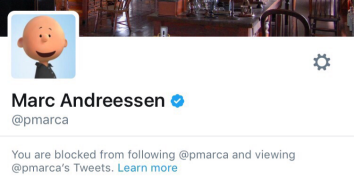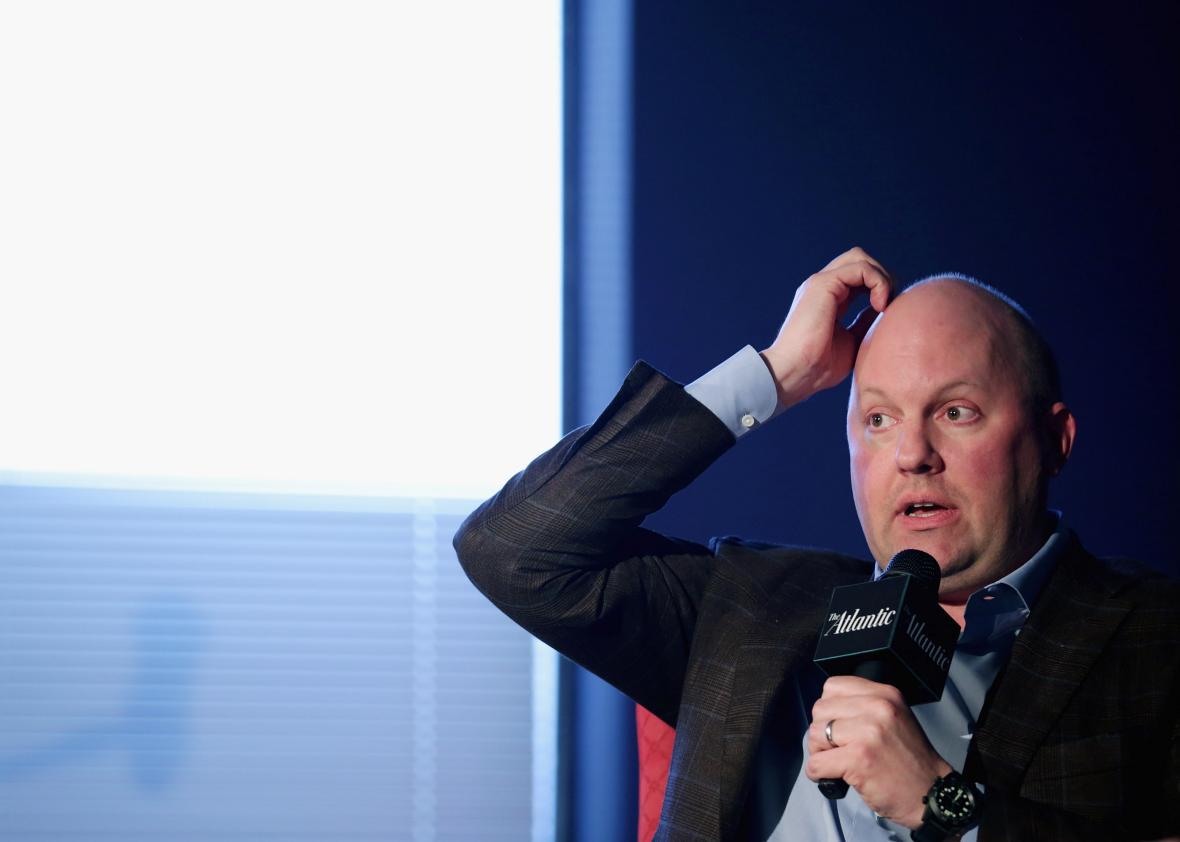If Twitter has seemed rather short on rose-tinted techno-optimism of late, the populist tide sweeping Western politics may not be the only reason. For the past six months, the service has also been missing the voice of its most voluble venture capitalist, Netscape and a16z co-founder Marc Andreessen.
Last Friday, Andreessen returned to the platform that helped to establish him as Silicon Valley’s cheerleader-in-chief, following a self-imposed “break” that began in September 2016. He marked his re-emergence with an unusual offer: to answer any question, for the price of a $20 donation from the questioner to the nonprofit Black Girls Code. (The price has since jumped to $100, suggesting either that popular demand for answers from Andreessen to life’s conundrums proved greater than he had anticipated, or that his patience for writing them proved lesser.)
To what extent Andreessen intends to interact with his social media followers on anything other than a pay-to-play basis going forward is not yet clear. But since he offered to answer questions, I took the opportunity to ask him one that had been on my mind even before he took his hiatus. Namely, why does a man seemingly so fond of publicity, and reputedly so welcoming of a debate, block so many journalists on Twitter? More importantly: Why does he block me on Twitter?
Like many others, I had followed Andreessen for his prolific tweets about Silicon Valley, investing, global development, and humanity’s future, which he insists is bright. He was fond of subtweeting the critics of today’s technology by highlighting the errors of naysayers past, such as the analysts who panned the first iPhone as “no Blackberry killer.” If he seemed often to cherry-pick data points to support his worldview, that mostly just made him a refreshing antidote to the legions of inveterate cynics who tend to fill my feed. He regularly tweeted Slate stories, including my own, sometimes adding a line of approbation or disagreement, and he retweeted me on several occasions. I had the vanity to imagine that he was fond of my work, despite my penchant for viewing his industry more critically than he was wont to. I appreciated his apparent tolerance for tech journalists who disagreed with him, and while I wasn’t about to stop doing so, the knowledge that he was reading did prompt me to think a little more carefully in some cases about whether my jibes were justified. I don’t think I ever tweeted an unkind word about the man, even if I’d harbored a few ungenerous thoughts.

Screenshot / Twitter for iOS
And then one day last summer he was gone from my feed. I discovered he’d blocked me, for no reason that I could immediately identify. I wondered, briefly and foolishly, whether he had done so by mistake. But in digging through my old tweets, I found that the block came on a day when I had been criticizing Andreessen’s fellow Silicon Valley investor, and fellow Facebook board member, Peter Thiel, for his pro-Trump speech at the Republican National Convention. I lashed out, a little childishly, with the sort of casually nasty tweet he would have hated, had he still been following me. I was surprised to hear from several other journalists that he had blocked them, too, somewhere along the line. A little Googling revealed that we were actually part of a club of sorts: Getting blocked by Andreessen, according to one CNN Money article from December 2015, was “the new cool.”
Andreessen deleted all of his tweets when he went on hiatus, and now that he’s back they’re still gone—but his block list, it seems, is intact. I learned of his return when an editor posted his tweet in Slack. This time when I tweeted about it (yes, again), I got even more replies from journalists and other Twitter notables consigned to his black list.
As blacklists go, it’s an illustrious one, if I can say so without implying that my presence there makes it so. Those who follow tech closely will not be shocked to learn that it includes the likes of Intercept reporter Sam Biddle, who made his name as a bomb-throwing blogger for Valleywag; self-professed “brilliant jerk” Antonio Garcia Martinez, author of an exposé about Facebook; or even Gizmodo’s charmingly insouciant tech teen William Turton. (Vice’s Nellie Bowles joked that Turton was “an obvious block.”) The list also takes in such established reporters and commentators as the New Yorker’s Nathan Heller, BuzzFeed’s Nitasha Tiku, and New York’s Max Read, who assumes he was blocked for the sin of defending Biddle. Bowles herself is an Andreessen blockee, as is San Francisco Chronicle pop culture critic Peter Hartlaub (a self-described “Twitter Switzerland” who claims he’s rarely blocked by anyone). Even the prominent cybersecurity account Swift on Security is evidently prohibited from reading or responding to the Silicon Valley oracle’s public musings. A public list of accounts blocked by Andreessen that someone took the time to assemble only deepens the mystery: an investigative reporter for ProPublica, the head of communications for Microsoft, and even fellow investors and tech founders have all managed to land in the man’s bad graces.
What does all of this say about a man who was praised by a fellow VC in the Wall Street Journal for being a good follow because he “didn’t care what people think?” Since he declined to comment to CNN Money, I can’t reach him via Twitter anymore, and my few attempts to contact him through his venture capital firm have gone nowhere, I decided to take the opportunity to pay the $20 and ask him directly. I sent the question on Friday via 21.co—a startup that Andreessen’s firm invests in—along with the requisite $22 payment. (Apparently he forgot to mention the $2 “service fee” in his tweet.) Here is what I asked:
Dear Marc,
Why do you block so many people on Twitter, and how do you choose which people to block? It seems like you block a lot of journalists who cover companies with which you are involved (including BuzzFeed’s Nitasha Tiku, Vice’s Nellie Bowles, New York Magazine’s Max Read, The New Yorker’s Nathan Heller, and Gizmodo’s William Turton, to name just a few). Are you trying to prevent them from reading your tweets? Thank you for this opportunity to reach you with a question, which I’m unable to do on Twitter, because you’ve blocked me too. I’m happy to support the cause of Black Girls Code and look forward to your response. — Will Oremus, Slate Magazine
Technically, Andreessen was supposed to respond within 48 hours, but he got back to me Monday morning, which is close enough. No doubt he was experiencing a high call volume. Here was his coy response:
Hi Will – thanks for the question! – as far as I’m concerned, the only flaw of the United States Constitution is that the founders left out Right To Block On Social Media from the Bill of Rights! :-) All the best, Marc
In the end, it was probably just the sort of response I deserved for spending entirely too much time thinking about why a man I’ve never met has me blocked on social media. Certainly it brings me no closer to grasping the mental or psychological posture of a public figure whose relentless, wonky optimism helps to define Silicon Valley to itself and to the world.
For now, I can only conclude that Andreessen maintains that sunny outlook partly by shielding his eyes from those who would cloud it with their pessimism, or the skepticism which which they regard his industry’s claims to be making the world a better place. And, of course, that he’s rather thinner-skinned than he’d like to let on, which is hardly a novel insight: A 2015 New Yorker profile quoted an anonymous “close friend” as saying, “When he feels disrespected, Marc can cut you out of his life like a cancer.” His own partner at a16z, Ben Horowitz, added in the same profile that Andreessen was “much more sensitive than I am, actually. He’ll get upset about body language … .”
That’s illuminating in its way, I suppose, and you could probably draw from it some unflattering generalizations about Andreessen and the powerful industry he represents, were you so inclined. Then again, who among us doesn’t get at least a little touchy when people slight us on social media? Not the guy who just wrote 1,400 words about getting blocked by Marc Andreessen, that’s for sure.
